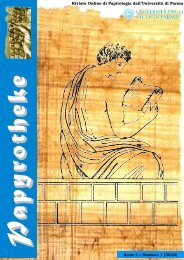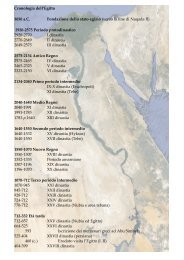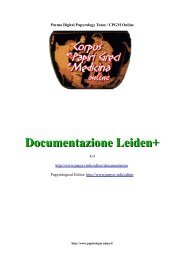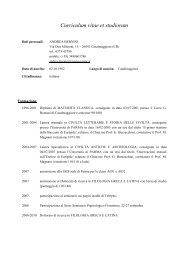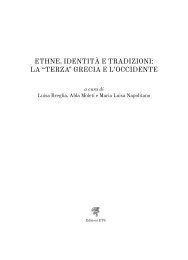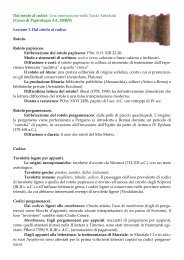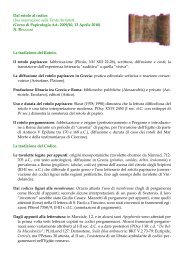The Michigan Medical Codex: P. Mich. Inv. 21 - Corso di Papirologia
The Michigan Medical Codex: P. Mich. Inv. 21 - Corso di Papirologia
The Michigan Medical Codex: P. Mich. Inv. 21 - Corso di Papirologia
Create successful ePaper yourself
Turn your PDF publications into a flip-book with our unique Google optimized e-Paper software.
138 L.C. Youtie<br />
<strong>The</strong> new Oxford Latin Dictionary (ed. P.G.W.Glare, 1982) has "oesypum, some<br />
times written oesopum (fr. Gr. oCcunoc). <strong>The</strong> grease obtained from unwashed<br />
wool (used in me<strong>di</strong>cine, as a cosmetic, etc.).<br />
<strong>The</strong> Azanites text of Paulus (VII 19.6) has otc'unou Wp4p&xou, "the me<strong>di</strong>c<br />
ament, oesypum"; but four of the MSS of Paulus have the spelling oCc6mou,<br />
while four other MSS have uccorTou = hyssop.50) Hyssop, an herbal plant, is<br />
of course out of the question in this recipe and the word should have been<br />
punctuated ucc'iToU = oCc)unou. <strong>The</strong> interchange of OL and u is extremely common.<br />
Cf. Gignac, Grammar, I 197, "This is the most frequent interchange in the<br />
papyri next to the interchanges of eL with L and aL with E." For the inter<br />
change of u and w, see Gignac, Grammar, I 293-4, and note that the Latin<br />
word is found with the same interchange. A double consonant, in place of a<br />
single consonant, and vice versa, is common enough to need no remark, although<br />
in the present instance it was undoubtedly caused by the similarity of sounds<br />
between ocuinoc and 'jccwnoc.51)<br />
<strong>The</strong> Azanites text of Aetius has bcc6noU, with no recorded variants in the<br />
MSS, but the presence of the short <strong>di</strong>rection at the end of the recipe, T'EcLc<br />
XP, "melt the ingre<strong>di</strong>ents together and use," shows that the ingre<strong>di</strong>ents must<br />
all be TnxT&L, i.e. soluble ingre<strong>di</strong>ents. Hyssop is a plant or small shrub,<br />
and would be among the dried ingre<strong>di</strong>ents in the familiar brief <strong>di</strong>rection, Tla<br />
TITRTL XaTCL T5V Enp65v, "add the melted ingre<strong>di</strong>ents to the dried ingre<strong>di</strong>ents."52)<br />
We must therefore read in the Aetius text 6cc6rToU = o-ci5iou.<br />
10-11. cxeaToc oM[ou xaL Tau]pLou: Cf. D, 6 for the spelling CLou, and A,<br />
8-9 for E[i]iou. <strong>The</strong> Galen text of the recipe has the same two fats, that of<br />
swine and of bulls, but only half the amount of each, i.e. 3 oz. instead of<br />
6 oz. <strong>The</strong> Aetius recipe has the same two again, but specifies that the pig<br />
fat should be old and pure (n0rXCLLou xo.a&poG) and there should be 6 oz. of it<br />
to 3 oz. of bull fat. <strong>The</strong> recipe of Paulus calls for the same ratio of pig fat<br />
to bull fat (24 oz. to 12 oz.), but XOLpECOU iS substituted for i660ou, i.e.<br />
fat of young pig rather than full-grown pig. Oribasius calls for an amount<br />
of pig fat four times that of bull fat, i.e. 12 oz. to 3 oz. and requires the<br />
pig fat to be melted separately (cTEa.Toc, 6E'OU T1TfnXOToC).<br />
11-12. mE[uxivvnc (o6y.) ?: ? is restored from Galen and Aetius, whose<br />
amounts in general are comparable to those in <strong>21</strong> B. But Galen has r5nrTvnc<br />
rEeuxLvnc; Oribasius has n6vuxLvnc rn-flLvTlc n TLLTU'vTnc; and Aetius, TLTUUV-nc<br />
ni rTE:UXVnCc; while Paulus has k'nLvnc xoXopcvixac.<br />
49) Cf. Webster's Third New International Dictionary, 1971, s.v. lanolin:<br />
"wool grease refined for use chiefly in ointments and cosmetics; ... it is<br />
much used as a basis for ointments."<br />
50) For the confusion of oCcunoc with uccwnoc among the ancient writers,<br />
see Stephanus, TGL, s.v. U'ccwnoc.<br />
51) Cf. LSJ, s.v. 'ucc&noc, for the spelling with one sigma, and likewise<br />
Latin hys(s)opum.<br />
52) Cf. A, 11; B verso, 12.



